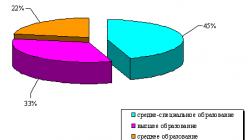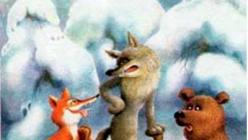(347 words) The main place in the work of Nikolai Vasilyevich Gogol is given to the theme of the people. During the life of the author, Russia was ruled by landowners and officials, who were like the heroes of the work "Dead Souls". Therefore, the writer depicted the bleak scenes of the survival of serfs. Noble landowners mercilessly use their labor, sometimes treating them like slaves: they buy and sell like their property, sometimes separating them from the family.
Watching the scam of the protagonist of the poem, Chichikov, it immediately becomes clear in what a sad state the Russian peasantry is arriving. The estates of the landowners are replaced one after another, but overall picture the sad state of the serfs is the same: a low standard of living, a horrendous percentage of deaths, advanced stages of disease, a constant lack of food and all-consuming poverty. Someone, like Manilov, simply does not care about the condition of people, letting their lives take their course. Someone, like Sobakevich, keeps them in a tight leash, making capital. Someone, like Korobochka, keeps everything in perfect order, but does not understand the needs and aspirations of the peasant, using him only as draft animals. Someone like Nozdryov mindlessly swindles and squanders all the results of peasant labor overnight. And someone like Plyushkin brings his faithful servants to starvation with his greed.
However, in the soul of the serf people there is a thirst for freedom. When captivity becomes an unbearable burden, they run away from their "slave owners". Only now, flight rarely ends in liberation. Nikolai Vasilievich reveals the typical life of a fugitive: without a job, without a passport, in most cases in prison. Although Popov, who worked as a courtyard for Plyushkin, chose prison instead of working for his master, such a choice can be characterized as throwing between two evils, of which the lesser is chosen.
The country under the rule of rude and ruthless masters gave rise to uneducated Uncle Minya and the courtyard Pelageya, who did not understand which side was right and which was left. However, before us opens the power of the Russian people, infringed, but not torn to pieces by serfdom. It is all in such people as the brave Stepan Probka, the gifted Mikheev, and simply in the hard-working and energetic Russian people who do not lose heart in any, even the most difficult situations.
In the image of feudal-serf Rus', Nikolai Vasilyevich Gogol revealed Russia not only as a landowner-bureaucratic, but also a people's country, with its gifted and strong population. He showed his confidence in the bright future of the motherland, if its support - the peasantry - rises from its knees.
Interesting? Save it on your wall!In Gogol's poem Dead Souls“The theme of the people occupies one of the leading places. In Gogol's time, Russia was ruled by landlords and officials, "obsequious slaves of power and ruthless tyrants of their slaves, drinking the life and blood of the people" (according to Herzen's apt definition).
The author shows a bleak picture of the life of the serfs. The landlords ruthlessly exploit them, treat them like their slaves, acquire and sell them like things. "Dubinogolovaya" Box, afraid to sell too cheap dead souls, complains to the guest: “... I have never happened to sell the dead. I gave up the living ones, and here and the third year to the archpriest two girls, a hundred rubles each ... ”. Peasants are obliged to fulfill all the whims of their masters. Before going to bed, Korobochka asks Chichikov: “Maybe you are used to, my father, for someone to scratch your heels at night? My dead man couldn’t fall asleep without it.”
Nozdryov's "breadth of nature" has a detrimental effect, first of all, on the serfs. Their work is valued. Everything that was grown by the labor and sweat of the peasants and sold at the fair “at the best price”, the landowner lowered in a few days. Proudly says this to Chichikov: “Congratulations: blown into fluff!”
A terrifying picture of the life and overwork of the people, their patience and courage, outbursts of protest, is presented by the author during Chichikov's reflection on the list of dead souls he acquired. Reading the names of the peasants, the hero, with a sigh, said: “My fathers, how many of you are stuffed here! What have you, my hearts, been doing in your lifetime? How did you get by?” The image of the carpenter Stepan Cork, endowed with heroic strength, who probably went all over the provinces with an ax in his belt, attracts attention. No less interesting is the image of the shoemaker Maxim Telyatnikov, who studied with a German and failed to organize his own business. Apparently, he drank himself, lay drunk on the street, saying: “No, it’s bad in the world! There is no life for a Russian person, all the Germans interfere.” Grigory When you got there, you didn't get there, he worked as a cart driver, renounced his home and gave his soul to God somewhere on the road.
The image of the people in the poem "Dead Souls". The poem "Dead Souls" occupies a special place in the work of N.V. Gogol. Gogol's global plan is to show the whole of Russia in the context, all its vices and shortcomings. Most of the population of Russia at that time were peasants. In the poem, their world is described very figuratively.
In my opinion, it is divided into several components. Every landowner always has a little world of peasants that belongs to him and characterizes him.
The peasants themselves are not described, but we can judge them by their dwellings. At Manilov, for example, "gray log huts darkened up and down."
Korobochka already had other huts, "which, although they were built scattered, but, according to a remark made by Chichikov, showed the contentment of the inhabitants." The peasant lands of Sobakevich are not surprising - we see them the way we expected to see them - "poorly tailored, but tightly sewn." The huts of Plyushkin's peasants, like himself, are shown as old, dilapidated, practically unnecessary. In addition to the worlds of the peasants, there are, in my opinion, other worlds. The first is the allegorical world of the peasants who died or fled from their landlords, which is very different from all the others, and is mentioned only occasionally.
Also on the pages of the poem, we feel the presence of another one - the so-called "central world of the peasants, presented in specific situations. The most strange and incomprehensible, probably, is the world of the dead or fled peasants for us. Its inhabitants are, as it were, opposed to the population of the world of the "living".
With the help of this technique, Gogol manages to emphasize the poverty of the morals of the main characters. After the excessively boastful speech of Sobakevich, describing his dead peasants, he himself, cunning and selfish, descends in our eyes at once to several levels. But the peasants - the property of the landowner, skillful, spiritually rich people were forced to meekly obey a person with the life principles of a tradesman.
The following reminders of this world show us it from a completely different side. It appears to us as the "world of the living", those who have left the "world of the dead". The so-called central world requires special attention. He imperceptibly merges into the narrative at the very beginning of the poem, but her story line does not often come into contact with him. At first, it is almost invisible, but then, along with the development of the plot, the description of this world is revealed.
At the end of the first volume, the description turns into a hymn to all Rus'. Gogol figuratively compares Rus' "with a brisk and irresistible troika" rushing forward. Throughout the story, the writer exalts the peasants, who constitute the main, most active and useful part of this world, by contrast with the deliberately humiliated landowners, officials, and employees. The description of this world begins with a conversation between two crafty peasants discussing the technical capabilities of the carriage entering the city of NN. On the one hand, their conversation gives off idleness, one feels its incompleteness, uselessness.
But, on the other hand, both of them showed a fairly high level of knowledge of the structure and capabilities of the crew. These two characters, in my opinion, are inexpressive and are shown more from a negative side than from a positive one. They appear at the very beginning of the work and, as it were, introduce us into the world of the poem. The next colorful representatives of the "central world" shown in the poem are two men who showed Chichikov the way to Manilovka. They know the territory well, but their speech is still lame.
The most colorful character among the peasants, in my opinion, is the one we saw when he dragged "a thick log E like a tireless ant to his hut." He expresses the whole sweeping nature of the Russian people. Gogol emphasizes this, speaking through his lips "an aptly spoken Russian word." The most striking expression of the writer's patriotic feelings in the poem is a discussion about the fate of Rus'.
Comparing her "immense expanses" with the incalculable spiritual riches of her people, Gogol sings a laudatory ode to her: "Is it not here, in you, that an infinite thought is born when you yourself are without end? Is it not possible for a hero to be here when there is a place where he can turn around and walk around?
And menacingly, a mighty space embraces me, reflecting with terrible power in the depths of my soul; My eyes lit up with an unnatural power: wow! What a sparkling, wonderful, unfamiliar distance to the earth! - Rus!"
The topic that the author raises expands from page to page. Buying the dead shower becomes a description of the life of the peasantry. The people in the poem "Dead Souls" rise with their diversity, talent, kindness and insane desire to live.
Feature of the Russian character
The classic lovingly describes the characters from the people. A Russian person is not afraid of a difficult climate, severe frosts. He is not afraid of Kamchatka. A man will sew mittens for himself, if he gets cold, he will clap his hands. With one ax he will cut down a hut for himself, which will stand for more than one century. The people, under the pen of the author, come out with a surprisingly beautiful image:
- charming face of the Madonna;
- rounded oval of the cheeks;
- wide size.
In Rus', everything is wide and spacious: fields, mountains, forests. The writer puts his face, lips and legs on the same line with them. The widest part of the people is its soul.
Russian word
Gogol loves Russian speech. He favors French words and expressions, but a man's weighty biting word is often brighter than foreign phrases. There is no alien language in the poem, everything is native to the people.
The names of the characters are interesting. Somewhere they look grotesque, someone can laugh at them, but in them the ability of the people to grab the most weighty and alive from the environment.
- Zavalishin - the desire to fall on its side;
- Polezhaev - love of relaxation;
- Sopikov - quiet sniffing through the nose during sleep;
- Khrapovitsky - a dead dream with "snores", a whistling nose.
Gogol points out the words that work "miracles on a Russian person." One of those words is forward. Russian appeals raise uprisings, sink deep into the soul. The Russian word makes me shudder. In a word, the Russian people can characterize an entire estate.
The mighty power of the Russian peasant
Chichikov, through the mouth of Gogol, talks about the people, studying the list of peasants bought by him. There are no living ones in the list, but the author presents everyone in such a way that their image rises before the reader. Moreover, it is easier to see the dead than the landowners, blurred from the abundance of food or dried up from greed. Gogol shows the hardships of the life of the common people. Serf bondage, humiliation lead to escapes. Freedom is not given to everyone. Most fall into even greater bondage. It is surprising that the desire to be free in men does not die. The peasants are fighting for their rights - the murder of Drobyazhkin. Gogol emphasizes one feature - glibness. It is in everything - in movements, in mind, in talent.
Labor and people
Beautiful palaces, multi-window halls, painted walls hide the work of talented craftsmen from the people. The craftsmen create masterpieces from stone blocks. Formless and dead, they come to life under the master's axe. The reader sees how the creation of the people perishes. Manilov's ponds are overgrown, Nozdryov's kennels are emptying, Plyushkin's rooms are covered with dust. The daring nature seems to highlight the wretchedness of the dying estates. Against the backdrop of amazing landscapes, the eyes of men from the list of audit souls shine. They are no more, but the memory and deeds are alive.
A storehouse of intelligence and cunning
The people in the poem are not just hardworking, they are wise and cunning. Gogol admires the Russian man, but confesses his vices. What amazing features the writer emphasizes:
- the ability to communicate: the shades of the conversation, incomprehensible to foreigners, will depend on the number of souls of the person they are talking to;
- decisiveness: will not go into reasoning when it is necessary to act;
- unwillingness to confess guilt;
- the ability to envy the necessary acquaintances.
Even negative qualities character distinguish Russian from others.
The concept of the people in the work becomes so broad that it is difficult to cover it. It will not work to write an essay “The people in the poem“ Dead Souls ”if you are based on one social stratum. The people are peasants, landowners, officials, everyone whom the writer tried to portray.
Artwork test
Russia in Gogol's time was ruled by landowners and officials like the heroes of Dead Souls. It is clear in what position the people, the serfs, should have been.
Following Chichikov in his journey from one landowner's estate to another, we observe a bleak picture of the life of the serfs: their lot is poverty, disease, hunger, terrible mortality. The landlords treat the peasants as if they were their slaves: they sell them one by one, without families; manage them like things. “Perhaps I’ll give you a girl,” Korobochka says to Chichikov, “she knows the way with me, just look! Don’t bring it, the merchants have already brought one from me.”
In the seventh chapter, Chichikov reflects on the list of peasants he bought. And before us is revealed a picture of the life and hard work of the people, their patience and courage, violent outbursts of protest. Particularly attractive are the images of Stepan Cork, endowed with heroic strength, a wonderful carpenter-builder, and Uncle Mikhey, who resignedly replaced the murdered Stepan in his dangerous work.
The desire for freedom lives in the soul of the enslaved peasantry. When the peasants are no longer able to endure serfdom, they run away from the landowners. True, flight did not always lead to freedom. Gogol tells ordinary life fugitive: life without a passport, without work, almost always arrest, prison. But the courtyard Plyushkina Popov still preferred life in prisons to returning under the yoke of his master. Abakum Fyrov, fleeing from serfdom, went to barge haulers.
Gogol also speaks of cases of mass indignation. In the episode of the assassination of the assessor Drobyazhkin, the struggle of the serfs against their oppressors is shown.
The great realist writer, Gogol figuratively speaks of the oppression of the people: “The police captain, even if he doesn’t go himself, but only send one cap to his place, then this cap alone will drive the peasants to their very place of residence.”
In a country where peasants were ruled by cruel and ignorant boxes, nostrils and dogs, it was not surprising to meet both the stupid Uncle Mityai and Uncle Minya, and the yard Pelageya, who did not know where the right and where left-hand side.
But Gogol sees at the same time the mighty strength of the people, crushed but not killed by serfdom. It manifests itself in the talent of Mikheev, Stepan Probka, Milushkin, in the diligence and energy of the Russian person, in his ability not to lose heart under any circumstances. “A Russian person is capable of everything and gets used to any climate. Send him even to Kamchatka, but give only warm mittens, he will clap his hands, an ax in his hands, and went to cut himself a new hut, ”the officials say, discussing the resettlement of Chichikov’s peasants in the Kherson province. Gogol also speaks of the high qualities of the Russian person in his remarks about the “brisk people”, about the “quick Yaroslavl peasant”, about the remarkable ability of the Russian people to accurately characterize a person in one word.
Thus, depicting feudal-feudal Rus', Gogol showed not only landowner-bureaucratic Russia, but also people's Russia, with its staunch and freedom-loving people. He expressed his faith in the living, creative forces of the working masses. Bright image of the Russian people is given by the writer in his famous likening of Russia to a “troika bird”, personifying the essence of the national Russian character.



